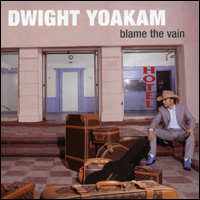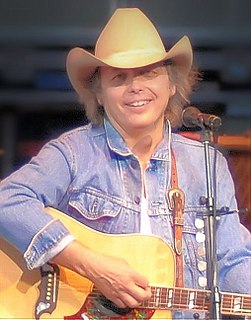
Dwight David Yoakam is an American singer-songwriter, musician, and actor, known for his pioneering style of country music. First becoming popular in the mid-1980s, Yoakam has recorded more than 20 albums and compilations, charted more than 30 singles on the Billboard Hot Country Songs charts, and sold more than 30 million records. He has recorded five Billboard No. 1 albums, twelve gold albums, and nine platinum albums, including the triple-platinum This Time.

If There Was a Way is the fourth album by Dwight Yoakam. Five of its tracks would rise into the Top 40 of the Billboard Hot Country Singles chart in 1991 and 1992. They were "Turn It On, Turn It Up, Turn Me Loose" at No. 11, "You're the One" at No. 5, "Nothing's Changed Here" at No. 15, "It Only Hurts When I Cry" at No. 7 "Send a Message to My Heart", at No. 47, and finally the No. 18 "The Heart That You Own".

Buenas Noches from a Lonely Room is the third album by country singer Dwight Yoakam. The album contains Yoakam's first two No. 1 Hot Country Singles singles. The first was "Streets of Bakersfield," a duet with country music veteran Buck Owens, who had originally released a version of the song in 1973. The second was an original composition of Yoakam's titled "I Sang Dixie." A third song on the album, "I Got You," also an original composition, peaked at No. 5. The title song, "Buenas Noches from a Lonely Room ," also charted, but only to the No. 46 position.
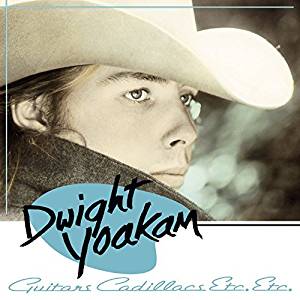
Guitars, Cadillacs, Etc., Etc. is country music artist Dwight Yoakam's debut album. It was also the first of three consecutive No. 1 Billboard Country Albums for him. The album was the first of more than a dozen Yoakam albums featuring his collaboration with record producer-guitarist Pete Anderson.

Hillbilly Deluxe is the second album by country music singer-songwriter, Dwight Yoakam. Released in 1987, it was Yoakam's second consecutive No. 1 album on the Billboard Country Albums chart. Four tracks were released as singles with each becoming Top 10 hits on the Hot Country Singles chart in 1987 and 1988.

This Time is the fifth album by American country music artist Dwight Yoakam, released by Reprise Records on March 23, 1993. Three of its tracks barely missed the top spot on the Billboard Hot Country Singles charts, each peaking at #2: "Ain't That Lonely Yet", "A Thousand Miles from Nowhere" and "Fast as You", the latter being his last Top 10 single. Two other tracks also rose into the charts: "Try Not to Look So Pretty" at #14 and "Pocket of a Clown" at #22. The album itself peaked at #4 on the Top Country Albums chart. Yoakam wrote or co-wrote all except for one of the tracks on this album.
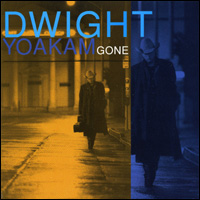
Gone is the sixth studio album by country music artist Dwight Yoakam, released on October 31, 1995 by Reprise Records. The album peaked at #5 on the Billboard Country Albums chart. It produced three singles on the Billboard Hot Country Songs charts: "Nothing" at #20, "Gone " at #51, and "Sorry You Asked?" at #59. The final single, "Heart of Stone", failed to chart in the United States. This was also the first album of his career not to produce a Top Ten country hit.

A Long Way Home is the ninth studio album of new recordings by Dwight Yoakam. It reached No. 11 on the Billboard Country Album, with two of its tracks charting on the Hot Country Singles chart. "Things Change" reached No. 17, while "These Arms" peaked at No. 57. Yoakam wrote all the songs on the album himself.
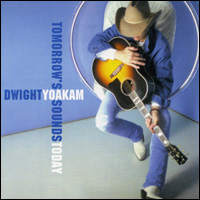
Tomorrow's Sounds Today is the eleventh studio album by country music artist Dwight Yoakam. This album was released on October 31, 2000. It rose to No. 7 on the Billboard Country Albums chart. There were two charting singles among its tracks: "What Do You Know About Love" at No. 26 and "I Want You to Want Me" at No. 49 on the Hot Country Songs chart. Also included are two duets with Buck Owens, who was a big influence on Yoakam's musical style. It was also Yoakam's last studio album for the Reprise label. After that album's release, Yoakam left Reprise for Warner Bros. in 2001.

Population Me is the 13th studio album by Dwight Yoakam. It was released in June 2003 via the Audium Records label. The album spawned two singles, "The Back of Your Hand" and "The Late Great Golden State".
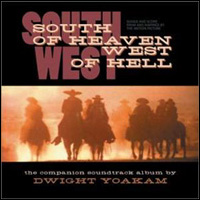
South of Heaven, West of Hell is country singer Dwight Yoakam's 12th studio album, and the first soundtrack album to the motion picture of the same name in which he starred, co-wrote and directed. Yoakam portrays a lawman in the early 1900s in the "wild west" of the Arizona Territory. Half of the tracks in the album are country music tracks. The other tracks are short snippets of straight dialog scenes from the film itself. There are many well-known co-stars in the movie, including Peter Fonda, Bridget Fonda, Paul Reubens, Billy Bob Thornton, Warren Zevon and Vince Vaughn. This was also Yoakam's only album for Warner Bros. after leaving Reprise.

Pete Anderson is an American guitarist, music producer, arranger and songwriter.

Dwight Sings Buck is country music artist Dwight Yoakam's 17th studio album, and a tribute album to Buck Owens. The album was released on October 23, 2007, by New West Records.

Under the Covers is the seventh studio album, and the first covers album recorded by Dwight Yoakam. It peaked at No. 8 on Billboard's Top Country Albums chart, and No. 92 on the Billboard 200.
"Honky-Tonk Man" is a song co-written and recorded by American country music singer Johnny Horton. It was released in March 1956 as his debut single on Columbia Records, and the album of the same name reaching number 9 on the U.S. country singles charts. Horton re-released the song six years later, taking it to number 11 on the same chart.

Last Chance for a Thousand Years: Dwight Yoakam's Greatest Hits from the 90's [sic] is the second greatest hits compilation album released by American country music singer Dwight Yoakam. It includes 11 of his hit singles from the 1990s, as well as three new recordings. These new songs are a cover of Queen's "Crazy Little Thing Called Love", as well as an adapted rendition of Rodney Crowell's "Thinking About Leaving" and "I'll Go Back to Her", originally by Waylon Jennings. “Crazy Little Thing Called Love,” which hit #12 on the country singles chart and rose to #64 on Billboard’s Hot 100, was Yoakam's biggest hit single since 1993's "Fast as You." Last Chance for a Thousand Years has been certified gold by the RIAA.

Just Lookin' for a Hit is the first greatest hits compilation album released by American country music artist Dwight Yoakam. It includes eight singles from his 1980s albums for Reprise Records, as well as two newly recorded cover songs: "Long White Cadillac", originally recorded by The Blasters, and "Sin City", originally recorded by the Flying Burrito Brothers.

Dwight's Used Records is a compilation album by American country music artist Dwight Yoakam. It was released by Audium Records on June 29, 2004. The album peaked at number 57 on the Billboard Top Country Albums chart.

3 Pears is the 18th studio album by American country music artist Dwight Yoakam. It was released on September 18, 2012 via Warner Bros. Records. The album, which includes collaborations with Beck, Kid Rock and Ashley Monroe of Pistol Annies, has been one of the most critically acclaimed recordings of Yoakam's career.

21st Century Hits: Best of 2000–2012 is the fourth greatest hits compilation album by American country music artist Dwight Yoakam. It was released by New West Records on October 1, 2013. It includes songs from the albums Tomorrow's Sounds Today, Population Me, Blame the Vain, Dwight Sings Buck and 3 Pears, as well as a previously unreleased duet with Michelle Branch and a cover of "Crazy Little Thing Called Love" from his previous greatest hits collection, the 1999 Last Chance for a Thousand Years, that also appeared on the soundtrack to the 2006 film The Break-Up.
